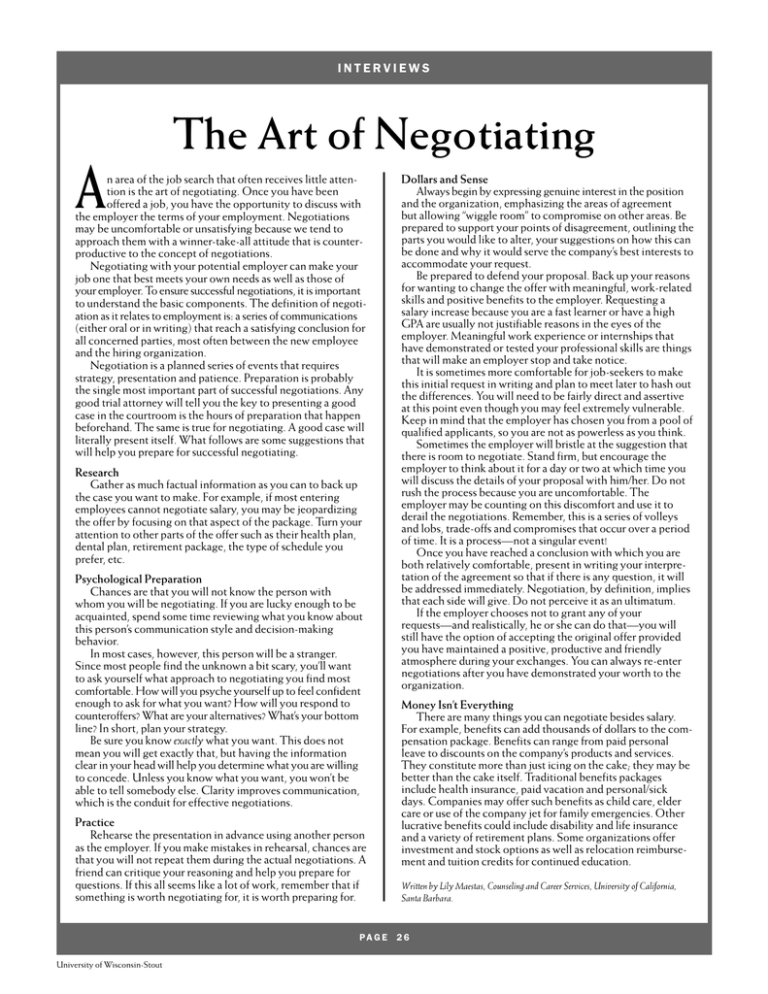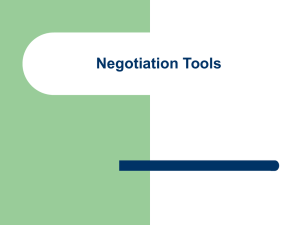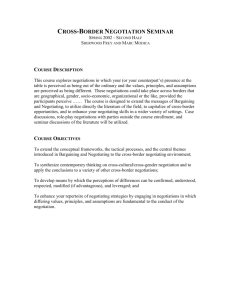A The Art of Negotiating S T A F F
advertisement

I N TS E TA R VFI E FWS The Art of Negotiating A n area of the job search that often receives little attention is the art of negotiating. Once you have been offered a job, you have the opportunity to discuss with the employer the terms of your employment. Negotiations may be uncomfortable or unsatisfying because we tend to approach them with a winner-take-all attitude that is counterproductive to the concept of negotiations. Negotiating with your potential employer can make your job one that best meets your own needs as well as those of your employer. To ensure successful negotiations, it is important to understand the basic components. The definition of negotiation as it relates to employment is: a series of communications (either oral or in writing) that reach a satisfying conclusion for all concerned parties, most often between the new employee and the hiring organization. Negotiation is a planned series of events that requires strategy, presentation and patience. Preparation is probably the single most important part of successful negotiations. Any good trial attorney will tell you the key to presenting a good case in the courtroom is the hours of preparation that happen beforehand. The same is true for negotiating. A good case will literally present itself. What follows are some suggestions that will help you prepare for successful negotiating. Research Gather as much factual information as you can to back up the case you want to make. For example, if most entering employees cannot negotiate salary, you may be jeopardizing the offer by focusing on that aspect of the package. Turn your attention to other parts of the offer such as their health plan, dental plan, retirement package, the type of schedule you prefer, etc. Psychological Preparation Chances are that you will not know the person with whom you will be negotiating. If you are lucky enough to be acquainted, spend some time reviewing what you know about this person’s communication style and decision-making behavior. In most cases, however, this person will be a stranger. Since most people find the unknown a bit scary, you’ll want to ask yourself what approach to negotiating you find most comfortable. How will you psyche yourself up to feel confident enough to ask for what you want? How will you respond to counteroffers? What are your alternatives? What’s your bottom line? In short, plan your strategy. Be sure you know exactly what you want. This does not mean you will get exactly that, but having the information clear in your head will help you determine what you are willing to concede. Unless you know what you want, you won’t be able to tell somebody else. Clarity improves communication, which is the conduit for effective negotiations. Practice Rehearse the presentation in advance using another person as the employer. If you make mistakes in rehearsal, chances are that you will not repeat them during the actual negotiations. A friend can critique your reasoning and help you prepare for questions. If this all seems like a lot of work, remember that if something is worth negotiating for, it is worth preparing for. Dollars and Sense Always begin by expressing genuine interest in the position and the organization, emphasizing the areas of agreement but allowing “wiggle room” to compromise on other areas. Be prepared to support your points of disagreement, outlining the parts you would like to alter, your suggestions on how this can be done and why it would serve the company’s best interests to accommodate your request. Be prepared to defend your proposal. Back up your reasons for wanting to change the offer with meaningful, work-related skills and positive benefits to the employer. Requesting a salary increase because you are a fast learner or have a high GPA are usually not justifiable reasons in the eyes of the employer. Meaningful work experience or internships that have demonstrated or tested your professional skills are things that will make an employer stop and take notice. It is sometimes more comfortable for job-seekers to make this initial request in writing and plan to meet later to hash out the differences. You will need to be fairly direct and assertive at this point even though you may feel extremely vulnerable. Keep in mind that the employer has chosen you from a pool of qualified applicants, so you are not as powerless as you think. Sometimes the employer will bristle at the suggestion that there is room to negotiate. Stand firm, but encourage the employer to think about it for a day or two at which time you will discuss the details of your proposal with him/her. Do not rush the process because you are uncomfortable. The employer may be counting on this discomfort and use it to derail the negotiations. Remember, this is a series of volleys and lobs, trade-offs and compromises that occur over a period of time. It is a process—not a singular event! Once you have reached a conclusion with which you are both relatively comfortable, present in writing your interpretation of the agreement so that if there is any question, it will be addressed immediately. Negotiation, by definition, implies that each side will give. Do not perceive it as an ultimatum. If the employer chooses not to grant any of your requests—and realistically, he or she can do that—you will still have the option of accepting the original offer provided you have maintained a positive, productive and friendly atmosphere during your exchanges. You can always re-enter negotiations after you have demonstrated your worth to the organization. Money Isn’t Everything There are many things you can negotiate besides salary. For example, benefits can add thousands of dollars to the compensation package. Benefits can range from paid personal leave to discounts on the company’s products and services. They constitute more than just icing on the cake; they may be better than the cake itself. Traditional benefits packages include health insurance, paid vacation and personal/sick days. Companies may offer such benefits as child care, elder care or use of the company jet for family emergencies. Other lucrative benefits could include disability and life insurance and a variety of retirement plans. Some organizations offer investment and stock options as well as relocation reimbursement and tuition credits for continued education. Written by Lily Maestas, Counseling and Career Services, University of California, Santa Barbara. PA AG G EE 22 66 P University of Wisconsin-Stout






